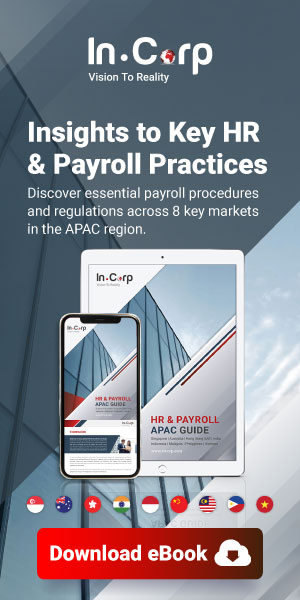Related Read: Singapore Corporate Tax Calculator
Basis of Taxation
-
Preceding Year Basis:
Singapore adopts the preceding year basis of taxation for all sources of income, meaning the incomes earned in 2017 will be taxed in the year 2018. Companies are required to file an estimate of their chargeable income with IRAS within 3 months after the end of their accounting period and to file their tax return by 30 November annually. -
Single Tier Taxation:
Singapore adopts a single-tier tax system. Dividends paid by a Singapore company to its shareholders are tax exempt. -
Territorial Basis of Taxation:
Tax is charged on incomes accruing in or derived from Singapore. Incomes earned outside Singapore is not chargeable unless it is received in or remitted into Singapore. Notably, Singapore has a wide network of Double Taxation Avoidance Agreements and Unilateral Tax Credit Relief System whereby a tax credit is available for foreign tax suffered by companies when their foreign sourced incomes become chargeable in Singapore.
Foreign sourced income is considered received in Singapore when it is:
- remitted to, transmitted or brought into Singapore;
- used to pay off any debt incurred in respect of a trade or business carried on in Singapore; or
- used to purchase any moveable property brought into Singapore.
Scope of Taxation – What incomes are chargeable?
For Singapore tax purposes, taxable income refers to:
- gains or profits from any trade or business;
- income from investment such as dividends, interest and rental;
- royalties, premiums and any other profits from property; and
- other gains that is revenue in nature.
- Frequency of transactions (buying and selling of properties);
- Reasons for acquiring and selling of property;
- Financial means to hold the property for long term; and
- Holding period
Tax Exempted Incomes
Shipping enterprises operating Singapore-registered ships in international waters and foreign ships enjoy tax exemptions on certain types of shipping income. Tax exemption is granted automatically to qualifying ship operators and ship lessors under the Maritime Sector Incentive (MSI) awards on gains from the disposal of vessels. However, tax exemption is not extended to gains from vessel disposal by companies engaged in the business of trading. Subject to certain conditions, specific foreign sourced incomes such as dividends, branch profits, and service incomes are exempt from tax. Gains derived by a company from disposal of equity investments in another company are not taxable unless they are of an income nature. Factors such as motive of seller, length of period of ownership of the shares disposed, frequency of similar transactions, reasons for the disposal and means of financing the acquisition of the shares are taken into consideration to decide if the gains are incomes. Presently, newly incorporated companies enjoy 75% exemption on the first S$100,000 of chargeable income and 50% exemption on the next S$100,000 of their chargeable income in each of the first three years. Partial tax exemption is available for all other companies on their annual chargeable income.Deductibles:
In arriving the taxable income, the profits and losses are adjusted by taking the following deductibles into consideration:- Expenses that have been wholly and exclusively incurred in generating the revenue.
- Interest expenses on borrowings made to generate the incomes.
- Royalty expenses that are wholly and exclusively incurred for generating the income.
- Provision for bad debt.
- Wear and tear allowances for assets used in the generation of the income.
- Unabsorbed wear and tear losses, unabsorbed losses, unused deductible donations brought forward from previous years. A one-year carry-back of current year’s unutilised wear and tear allowances and unutilised trade loss is allowed up to an aggregate sum of S$100,000.
- A Singapore incorporated company and its Singapore incorporated group members may transfer its current year’s unabsorbed allowances, losses and deductible donations to be offset against the assessable income of the latter.
- Capital expenditure or accounting depreciation. Wear and tear allowances may nonetheless be available on such expenditure. As Singapore does not tax on capital gains, accounting depreciation, regarded as a capital expense, is consequently not allowable. In its place, capital allowances are allowed on the following assets such as Intellectual Property, plant and machinery, approved R&D cost sharing payments and approved land intensified industrial buildings and structures.
- Income taxes paid or payable in Singapore or overseas;
- Payments to provident funds or societies not approved by the Minister for Finance; and
- Expenses incurred on private motor cars.
Resident tax rates
| From YA 2024 onwards | |||
|---|---|---|---|
| Chargeable Income | Income Tax Rate (%) | Gross Tax Payable ($) | |
| First $20,000 Next $10,000 |
0 2 |
0 200 |
|
| First $30,000 Next $10,000 |
– 3.50 |
200 350 |
|
| First $40,000 Next $40,000 |
– 7 |
550 2,800 |
|
| First $80,000 Next $40,000 |
– 11.5 |
3,350 4,600 |
|
| First $120,000 Next $40,000 |
– 15 |
7,950 6,000 |
|
| First $160,000 Next $40,000 |
– 18 |
13,950 7,200 |
|
| First $200,000 Next $40,000 |
– 19 |
21,150 7,600 |
|
| First $240,000 Next $40,000 |
– 19.5 |
28,750 7,800 |
|
| First $280,000 Next $40,000 |
– 20 |
36,550 8,000 |
|
| First $320,000 Next $180,000 |
– 22 |
44,550 39,600 |
|
| First $500,000 Next $500,000 |
– 23 |
84,150 115,000 |
|
| First $1,000,000 In excess of $1,000,000 |
– 24 |
199,150 | |


